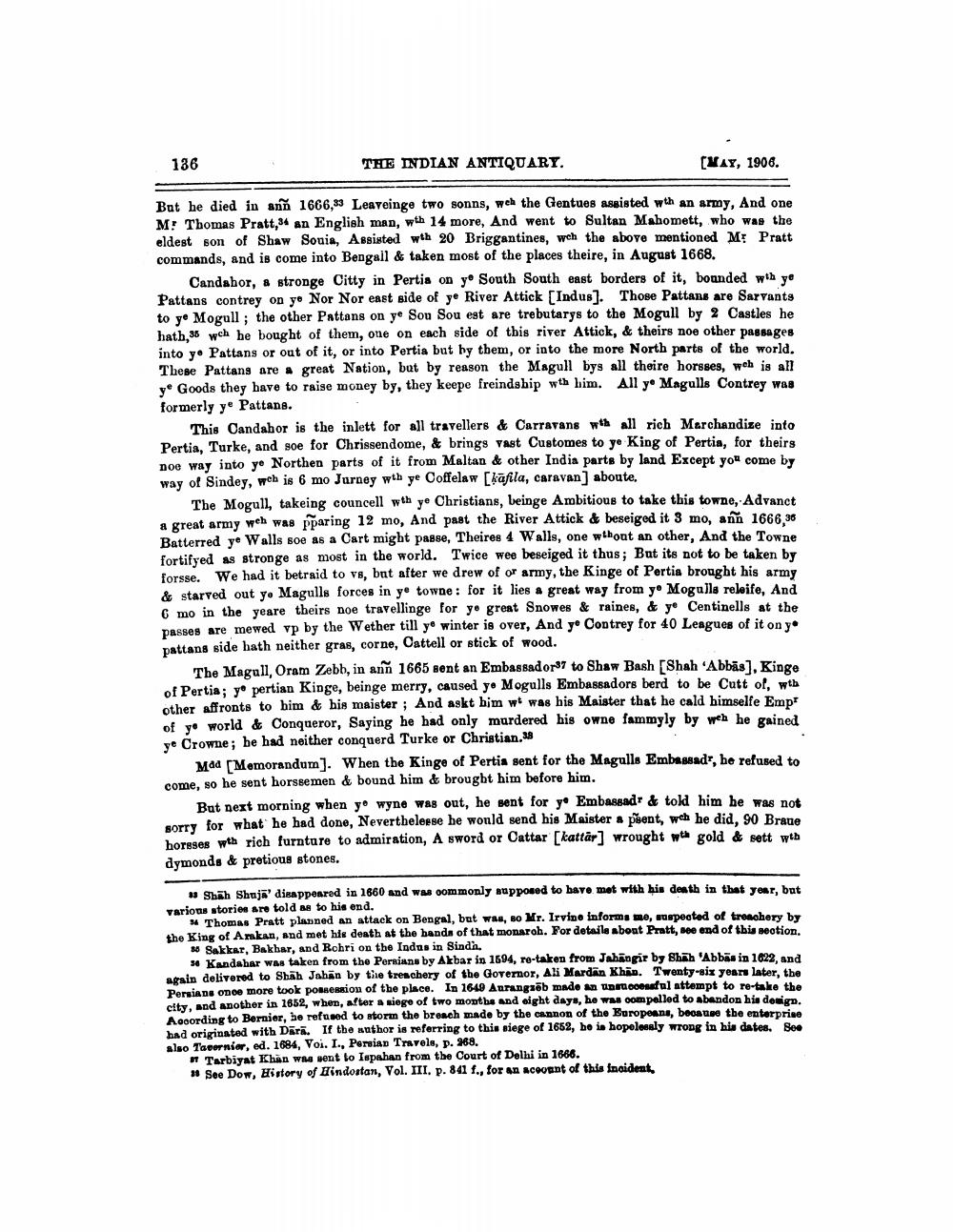________________
136
THE INDIAN ANTIQUARY.
[MAY, 1906.
But he died in ann 1666,33 Leaveinge two sonns, weh the Gentues assisted with an army, And one M: Thomas Pratt,34 an English man, wth 14 more, And went to Sultan Mahomett, who was the eldest son of Shaw Souia, Assisted wth 20 Briggantines, weh the above mentioned Mr Pratt commands, and is come into Bengall & taken most of the places theire, in August 1668.
Candahor, a stronge Citty in Pertia on y South South east borders of it, bounded with ye Pattans contrey on ye Nor Nor east side of ye River Attick [Indus]. Those Pattans are Sarvants to ye Mogull; the other Pattans on ye Sou Sou est are trebutarys to the Mogull by 2 Castles he hath,35 wch he bought of them, one on each side of this river Attick, & theirs noe other passages into ye Pattans or out of it, or into Pertia but by them, or into the more North parts of the world. These Pattans are a great Nation, but by reason the Magull bys all theire horsses, weh is all ye Goods they have to raise money by, they keepe freindship wth him. All ye Magulls Contrey was formerly ye Pattans.
This Candahor is the inlett for all travellers & Carravans wth all rich Marchandize into Pertia, Turke, and soe for Chrissendome, & brings vast Customes to ye King of Pertia, for theirs noe way into ye Northen parts of it from Maltan & other India parts by land Except you come by way of Sindey, weh is 6 mo Jurney wth ye Coffelaw [kafila, caravan] aboute.
The Mogull, takeing councell wth ye Christians, beinge Ambitious to take this towne, Advanct a great army weh was pparing 12 mo, And past the River Attick & beseiged it 3 mo, ann 1666,36 Batterred ye Walls soe as a Cart might passe, Theires 4 Walls, one without an other, And the Towne fortifyed as stronge as most in the world. Twice wee beseiged it thus; But its not to be taken by forsse. We had it betraid to vs, but after we drew of or army, the Kinge of Pertia brought his army & starved out ye Magulls forces in ye towne: for it lies a great way from ye Mogulla releife, And 6 mo in the yeare theirs noe travellinge for ye great Snowes & raines, & ye Centinells at the passes are mewed vp by the Wether till ye winter is over, And ye Contrey for 40 Leagues of it on y pattans side hath neither gras, corne, Cattell or stick of wood.
The Magull, Oram Zebb, in ann 1665 sent an Embassador37 to Shaw Bash [Shah 'Abbas], Kinge of Pertia; y pertian Kinge, beinge merry, caused ye Mogulls Embassadors berd to be Cutt of, wth other affronts to him & his maister; And askt him wt was his Maister that he cald himselfe Emp of ye world & Conqueror, Saying he had only murdered his owne fammyly by weh he gained ye Crowne; he had neither conquerd Turke or Christian.38
Mad [Memorandum]. When the Kinge of Pertia sent for the Magulls Embassadr, he refused to come, so he sent horssemen & bound him & brought him before him.
But next morning when ye wyne was out, he sent for ye Embassadr & told him he was not sorry for what he had done, Neverthelesse he would send his Maister a peent, weh he did, 90 Braue horsses with rich furnture to admiration, A sword or Cattar [kattar] wrought with gold & sett wth dymonds & pretious stones.
Shah Shuja' disappeared in 1660 and was commonly supposed to have met with his death in that year, but various stories are told as to his end.
54 Thomas Pratt planned an attack on Bengal, but was, so Mr. Irvine informs me, suspected of treachery by the King of Arakan, and met his death at the hands of that monarch. For details about Pratt, see end of this section. 35 Sakkar, Bakhar, and Rohri on the Indus in Sindh.
se Kandahar was taken from the Persians by Akbar in 1594, re-taken from Jahangir by Shah 'Abbas in 1622, and again delivered to Shah Jahan by the treachery of the Governor, Ali Mardan Khan. Twenty-six years later, the Persians once more took possession of the place. In 1649 Aurangzeb made an unsuccessful attempt to re-take the city, and another in 1652, when, after a siege of two months and eight days, he was compelled to abandon his design. According to Bernier, he refused to storm the breach made by the cannon of the Europeans, because the enterprise had originated with Dara. If the author is referring to this siege of 1652, he is hopelessly wrong in his dates. See also Tavernier, ed. 1684, Voi. I., Persian Travels, p. 268.
Tarbiyat Khan was sent to Ispahan from the Court of Delhi in 1666.
28 See Dow, History of Hindostan, Vol. III. p. 841 f., for an account of this incident,




